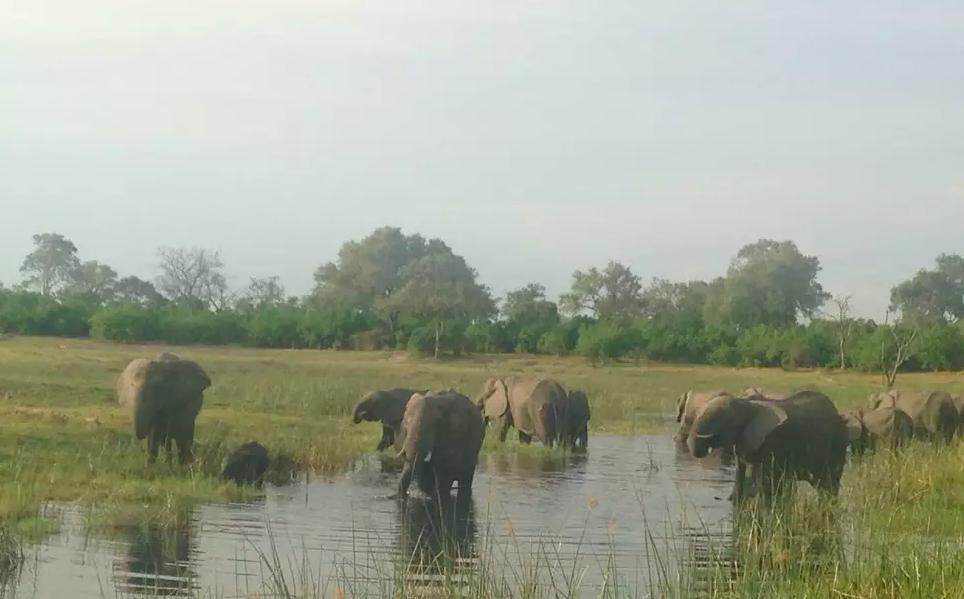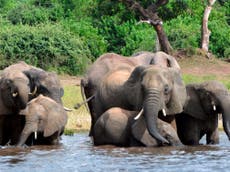The missing link: communication to combat wildlife crime
Naysan Sahba, UN Environment's Director of Communication,

Last month, conservationists near Botswana’s Okavango Delta wildlife sanctuary stumbled upon a shocking discovery. The carcasses of 87 elephants - most of them poached only for their tusks - scattered among the forest deep inside the country.
Described as the last sanctuary for elephants in Africa, poaching in Botswana had been infrequent until now. While surrounding countries have seen elephant populations dwindle at the hands of ivory poachers in recent decades, Botswana’s well-managed and heavily armed anti-poaching units kept most of their 130,000-member herd alive.
But the relentless advance of illegal trade in wildlife – a criminal industry estimated to be robbing countries of up to £17bn a year – continues to punch holes in some of the most promising anti-trade policies and enforcement efforts.
There is money to be made – lots of it. And that means the international community and law enforcement agencies have their work cut out for them if they want to protect species, great and small, from extinction.
The haunting reality of wildlife crime – of butchered elephants and rhinos; of hyacinth macaws and lemurs stuffed in suitcases, smuggled across international borders; – is miles removed from the shiny world of ivory statues, exotic pets, and exclusive beauty products.
In between, lies the dark world of poachers, traffickers, traders, and sellers. A network engaging in activities ranging from blatant criminal behavior to corruption-assisted skirting of the law.
Thanks to unwavering demand, business is thriving. Whether for cheap trinkets, trendy potions or priceless antiques, most buyers probably don’t think twice about its source.
There has been progress. Only a few years ago, being caught with ivory in Kenya resulted in a small fine, now the crime is punishable by time in jail. Domestic ivory bans continue to be implemented around the world. China, the largest market for ivory, officially prohibited sales in 2017 and others, including the UK, are lined up to follow.
This week, all eyes will be on London. Political leaders, Heads of State, Ministers and experts from over 82 countries as well as members of non-governmental organisations, academic institutions, and the businesses community will attend the 2018 Illegal Wildlife Trade Conference to discuss the latest strategies to protect our most precious natural resources and heritage.
And as the recent massacre in Botswana shows, this global gathering comes at a crises point for the world’s endangered wildlife. Between 2004 and 2015, some 7,000 different species were found in 164,000 seizures across 120 countries. This September, the Spix macaw of Brazil was declared extinct in the wild. The last male northern white rhino, Sudan, died in March.
As long as ivory remains a status symbol, or pangolin scales and rhino horn are thought to have ‘medicinal’ - even ‘magical’ powers – people will be willing to pay for them. Without stemming the cash flow from consumers to middlemen to poachers, the chain of illegal trade will never be broken.
If we really want to stop the trade in illegal wildlife products, we must be as relentless as the criminals we aim to stop. This means adopting bold policies that encourage new behaviours, strengthening law enforcement and breaking the supply chain; halting the booming online trade; and following the money to disrupt profits stashed in tax-havens.
According to the World Bank, of the $1.3 million dollars committed to tackling illegal trade in wildlife from 2010 to 2016, only 6 percent was devoted to communications and awareness to change peoples’ behaviour and to halt the demand. As showcased in successful public health campaigns, methodical, evidence-based communication with sustained cross-cultural campaigning, can achieve impressive results.
2 years ago, UN Environment launched our Wild for Life (https://wildfor.life) campaign to raise awareness about the threats posed by the illegal trade. Now we’re turning that awareness into action and multiplying the impact by putting the tools into the hands of governments. This Communication to Combat Wildlife Crime Toolkit and Demand Reduction Framework are designed to deliver the type of open-source, comprehensive campaign that can translate the plight of these animals into purchasing behaviours in our daily lives.
Only when illegal wildlife products lose their appeal – when elephant tusks gather dust and poachers have no market for their scales, skins, horns, pets and potions - will we win the fight against this illegal trade. If the money dries up, so will the poaching.
If those 87 dead elephants in Botswana and the legacy of the Spix macaw in Brazil are teaching us anything, it is that the world needs to invest in prevention and behaviour change communication right now. But this takes time, and some species have little to spare. The only way to secure a future for our wildlife now is to get every community on earth behind this message.


Join our commenting forum
Join thought-provoking conversations, follow other Independent readers and see their replies